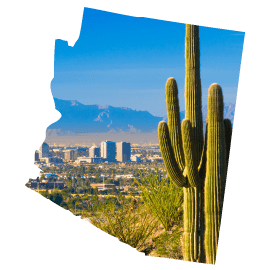Licensure Reciprocity: Arizona
Expanding the Pool of Teachers Policy
Analysis of Arizona's policies
Arizona does not support licensure reciprocity for certified teachers from other states.
Although out-of-state teachers must pass both the professional knowledge and subject knowledge portions of the Arizona Educator Proficiency Assessment (AEPA), waivers to this requirement are available that result in the state's not upholding its testing standards. Applicants may submit passing, out-of-state examination scores taken within the past seven years; teachers who passed their tests more than seven years ago must have five years of full-time teaching experience within the past seven years. Both exams may also be waived with a current certificate from the National Board for Professional Teaching Standards. Applicants must also verify a certain amount of Structured English Immersion training, based on when their out-of-state certificates were issued.
Teachers with valid, comparable out-of-state certificates are eligible for Arizona's Reciprocal Provisional Teaching Certificate. All out-of-state teachers must also take courses on the Arizona Constitution and the U.S. Constitution. However, they have three years to fulfill the requirement, and a test-out option is available. Transcripts are required for all applicants; it is not clear whether the state analyzes these transcripts to determine whether a teacher was prepared through a traditional or alternate route or whether additional coursework will be required.
Arizona is also a participant in the NASDTEC Interstate Agreement; however, the latest iteration of this agreement no longer purports to be a reciprocity agreement among states and thus is no longer included in this analysis.
Recommendations for Arizona
To uphold standards, require that teachers coming from other states meet testing requirements.
Arizona should insist that out-of-state teachers meet its own testing requirements, and it should not provide any waivers of its teacher tests unless an applicant can provide evidence of a passing score under its own standards.
Offer a standard license to certified out-of-state teachers, absent unnecessary requirements.
The state should offer standard licenses to certified out-of-state teachers rather than restricting them to provisional ones until they meet Arizona's requirements. Although the state requires additional coursework for out-of-state teachers, it is commended for allowing a test-out option. However, it should consider discontinuing its requirement for the submission of transcripts. Transcript analysis is likely to result in additional coursework requirements, even for traditionally prepared teachers; alternate route teachers, on the other hand, may have to virtually begin anew, repeating some, most or all of a teacher preparation program in Arizona. Regardless of whether a teacher was prepared through a traditional or alternate route, all certified out-of-state teachers should receive equal treatment.
State response to our analysis
Arizona disagreed with this analysis, but the state offered no further information.
Select another topic
Delivering Well Prepared Teachers
- Admission into Preparation Programs
- Elementary Teacher Preparation
- Elementary Teacher Preparation in Reading Instruction
- Elementary Teacher Preparation in Mathematics
- Middle School Teacher Preparation
- Secondary Teacher Preparation
- Secondary Teacher Preparation in Science
- Secondary Teacher Preparation in Social Studies
- Special Education Teacher Preparation
- Assessing Professional Knowledge
- Student Teaching
- Teacher Preparation Program Accountability
Expanding the Pool of Teachers
Identifying Effective Teachers
- State Data Systems
- Evaluation of Effectiveness
- Frequency of Evaluations
- Tenure
- Licensure Advancement
- Equitable Distribution
Retaining Effective Teachers
Exiting Ineffective Teachers
Research rationale
http://www.ncbex.org/ .

